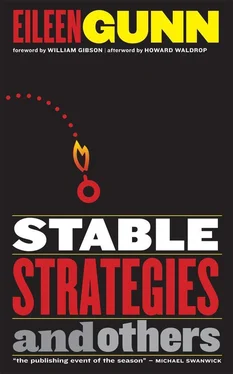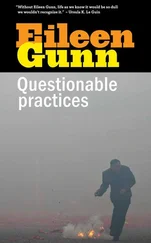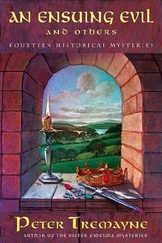The soft sounds behind her got louder. She didn’t look back, but pushed off down the hill toward the lodge. Two sets of tracks went up the hill, only one was going back down. Mia forced herself to concentrate on her skiing.
After an interminably long time, pushing herself through the darkening forest, she swung onto the logging road that led toward the lodge. She pushed her way ahead with long skating strokes; it was a low, easy grade downhill. There were no more noises behind her. But was that a soft slithering in the trees to the right? Just the wind? She refused to listen.
What had really happened, she asked herself. Could she have helped Zeb? Was there anything she could have done? Would the rangers believe her if she told them, or should she make up a story that made more sense?
There couldn’t have been live things in that pond. Maybe Zeb had caught his pole on some weeds, and the ice cracked and collapsed. She should have kept her head, and pulled him out. She had killed him by panicking.
The sound in the trees had passed her — just the wind after all. Mia knew she couldn’t have helped Zeb. She pushed her body harder. A muscle throbbed in her thigh. She ignored it.
She came to a small meadow, with young pines freckling its edge in the fog, and Mia recognized the last steep grade before the lodge. It was almost dark and she was tiring. She wasn’t good on steep hills, even when she was fresh, and with only one pole, she wasn’t balanced properly. She pushed her heels down and dug in the edges of her skis going around the narrow curves. She didn’t slow down.
She could see the lights up ahead now, hear the clanging of the yard-bell that helped skiers get their bearing in the fog. She dreaded arriving at the lodge. She dreaded having to tell anyone what had happened.
The logging road opened into the clearing, and Mia finally broke free of the forest. She was certain that nothing was following her: nothing had ever been following her. She stopped and looked back. There were no sounds behind or beside her, and she could see nothing moving.
Mia wanted to turn around and go back to the pond, to find Zeb and pull him out of the water, to breathe life back into him. She wanted to make right everything she had done wrong. It had been the anger inside her that had killed him, the force that lashed out at people close to her. Mia wasn’t crying, but her face was wet with tears, and they kept coming, as if they belonged to someone else.
She faced back towards the lodge and pushed off, but there were no lights up ahead now. Power failure? It was almost too dark to see, but the trail was still a lighter tone than the forest.
Suddenly, the outside lights of the lodge came on again. She was very close, just a few hundred yards more. It had started to snow, and the lights illumined the heavy flakes as they fell slowly. But there were still no lights on inside the lodge.
She skied closer, staring at the dark picture windows that faced the beginners’ slope. There was nobody inside, and it was very quiet. In the snow near the door, there were long brush marks, as though somebody had dragged a broom across it.
Mia peered into the windows. She had trouble focusing her eyes at first. Inside she could see huge, pale shapes bobbing slowly against the panes. Ragged bits of flesh and detritus swam in the air as in soup. Zeb floated there with the rest of them, his skin white and puckered, his eyes open and unseeing, his jaw slack. Aimlessly, as if on a current, he was drifting closer to the window.
These things wanted her. They were a part of her already — perhaps they had come from her. She would see this through to the end.
Mia skied over to the doorway and stopped. She tapped the toe clamps with her pole, and stepped out of the skis. Then she opened the door and went inside.
AUTHOR’S NOTE:
One day, early in 1981, my ever-helpful father called to tell me that Stephen King was judging a short-story contest for the Boston Phoenix , and I should enter. I had never written horror, but I was looking, as usual, for a deadline that would propel me through a story.
A few years before, I had had a vivid dream of watching from a height as a corpse’s foot broke through from beneath a frozen pond, and it seemed destined for a horror story. I chose a cross-country skiing setting because it seemed to work against the grain of horror, so maybe the material would not be too shopworn. I tried to write a story that would please both Stephen King and myself. Writing the story took the full six weeks allotted and gave me nightmares, but I finished it by the deadline and sent it off.
A few weeks later, I got a letter from the Boston Phoenix thanking me for entering and telling me I had finished in the top 1000. I envision them buried in thousands of really bad horror stories. Stephen King, of course, read a few that were filtered from the ocean of entries and chose a winner. This was pretty much what I had expected, and I wasn’t particularly crushed. Hey, now I had written three stories, and in only, what, six years? The pace left me breathless.
Jessica Amanda Salmonson bought the story for her anthology Tales By Moonlight , and, bless her heart, she persuaded Stephen King to write the introduction. King wrote a generous-spirited essay — most of the contributors were new writers — and it was enormously heartening to me to find out that, not only had Stephen King finally read the story that I had written specifically to please him, but that he actually liked it. Thank you, Stephen.
Nota bene : My partner, the very same John D. Berry who designed the volume you hold in your hand, also wrote a story for the Boston Phoenix contest. He finished in the top 500, and won a paperpack Stephen King book. Jessica took his story as well.
Eileen Gunn & Leslie What
Sunday morning. Barbara awoke from a Technicolor dream in which she was holding hands with the sexiest person in the universe (though the person’s head was blank and fuzzy, and she was afraid it might be a girl instead of a boy) and dove straight into a vision predicting her chemistry teacher’s death. Barbara watched the accident unfold as it would happen that night: Mrs. Rathbone, dressed in her scarlet microfiber inflatable-bra-and-bustle outfit with spangles and silver fringe, was going to teleport from the Microsoft Park marina to Microsoft Stadium on the other side of the lake. It would be a fundraiser for the basketball team at Cobain High, which meant that nobody Barbara knew would attend. Special-ed students didn’t do team sports.
The textile-arts class had added the fringe and spangles on Friday to get extra credit. Everyone was nervous, especially Mrs. R. She had never tried to teleport so far in public before.
Barbara never knew the why of things that she foresaw, so she wasn’t sure if it was the distance or maybe some kind of interference from the spangles and fringe that would cause Mrs. Rathbone to rematerialize surrounded by a hundred cubic meters of frigid lake water, flooding the stadium.
Not that it mattered: she couldn’t change the outcome anyway. She lay in bed, in the room she shared with her younger sister, holding the dread inside and ignoring the details of what she had just seen. Mrs. R was the only person she liked in the entire school.
Eventually her alarm clock went off, its tiny voice soft and insinuating: “B.J., this is the beginning of a wonderful new day! It’s truly lovely weather outside, and today’s Sunday, a great day to develop the extrovert in your personality!” It sounded like her mother, and its voice got louder and more insistently cheery if she ignored it. “Barbara! If you get up right now, you can — ” She whacked it with the heel of her hand and it shut up. Her sister was already downstairs watching cartoons. She had begun before dawn and would continue until bedtime, pausing only for commercials. Sometimes the whole cartoon was a commercial.
Читать дальше












